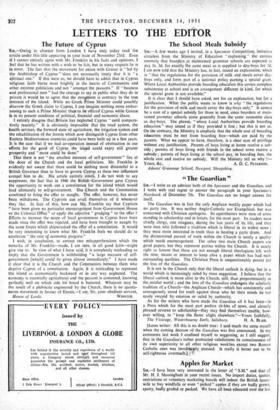The School Meals Subsidy
SIR,—A few weeks ago I invited, in a Spectator CompetitioN imitation circulars from the Ministry of Education " explaining " the curious anomaly that boarders at maintained grammar schools are expected to pay Is. 3d. for exictly ihe same meal as is supplied to day-boys for 7d. I am now told that the Ministry has, in fact, issued an explanation, which is "that the regulations for the provision of milk and meals cover day- boys only, and form part of a national policy faming a 'special grant. Where Local Authorities provide boarding education this covers complete subsistence at school and is an arrangement different in kind, for which the special grant is not!available."
It is clear that I should have asked, not for an explanation, but for a justification. What the public wants to know is why "the regulations for the provision of milk and meals cover the day-boys only." It cannot be a case of a special subsidy for those in need, since boarders at main- tained grammar schools come generally from the same economic class as day-boys. The phrase,- "where Local Authorities provide boarding education" may sound as if they provided it free; but this is not so. On the contrary, the Ministry is emphatic that the whole cost of boarding edtacation must be met from boarding fees—which are paid by the parents. What we appear to have, therefore, is a clear case of privilege without any justification. Parents of boys living at home receive a sub- sidy; parents of boys living with friends in the school town receive a subsidy ; parents of boys living at the school pay, in boarding fees, the whole cost and receive no subsidy. Will the Ministry tell us why ?-






































 Previous page
Previous page